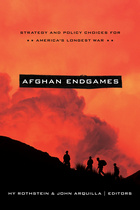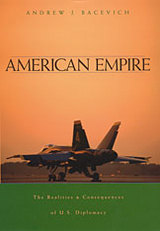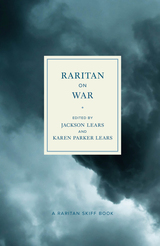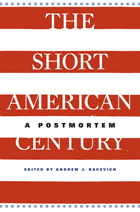
A balanced, comprehensive, and clear-eyed survey of the alternative strategies that can be pursued with the hope of restoring peace and stability to Afghanistan.

In a challenging, provocative book, Andrew Bacevich reconsiders the assumptions and purposes governing the exercise of American global power. Examining the presidencies of George H. W. Bush and Bill Clinton--as well as George W. Bush's first year in office--he demolishes the view that the United States has failed to devise a replacement for containment as a basis for foreign policy. He finds instead that successive post-Cold War administrations have adhered to a well-defined "strategy of openness." Motivated by the imperative of economic expansionism, that strategy aims to foster an open and integrated international order, thereby perpetuating the undisputed primacy of the world's sole remaining superpower. Moreover, openness is not a new strategy, but has been an abiding preoccupation of policymakers as far back as Woodrow Wilson.
Although based on expectations that eliminating barriers to the movement of trade, capital, and ideas nurtures not only affluence but also democracy, the aggressive pursuit of openness has met considerable resistance. To overcome that resistance, U.S. policymakers have with increasing frequency resorted to force, and military power has emerged as never before as the preferred instrument of American statecraft, resulting in the progressive militarization of U.S. foreign policy.
Neither indictment nor celebration, American Empire sees the drive for openness for what it is--a breathtakingly ambitious project aimed at erecting a global imperium. Large questions remain about that project's feasibility and about the human, financial, and moral costs that it will entail. By penetrating the illusions obscuring the reality of U.S. policy, this book marks an essential first step toward finding the answers.

“The supreme American theologian of the twentieth century.”—Arthur Schlesinger Jr., New York Times
“Niebuhr is important for the left today precisely because he warned about America’s tendency—including the left’s tendency—to do bad things in the name of idealism. His thought offers a much better understanding of where the Bush administration went wrong in Iraq.”—Kevin Mattson, The Good Society
“Irony provides the master key to understanding the myths and delusions that underpin American statecraft. . . . The most important book ever written on US foreign policy.”—Andrew J. Bacevich, from the Introduction

On War gathers together some of the finest writing on that troubling subject published in Raritan between 2003 and 2022. The editors, Jackson Lears and Karen Parker Lears, have selected work that typifies Raritan’s wide-ranging sensibility--focusing on a topic that is aesthetically rich, intellectually challenging, and morally disturbing. It is also all too timely.
Contributors: C. Felix Amerasinghe; Andrew J. Bacevich; Victoria De Grazia; Tamas Dobozy; David Ferry; M. Fortuna; Cai Guo-Qiang; Emma Dodge Hanson; Jochen Hellbeck; Karl Kirchwey; Ray Klimek; Peter LaBier; Patrick Lawrence; d. mark levitt; Michael Miller; Lyle Jeremy Rubin; Elizabeth D. Samet; Sherod Santos; Robert Westbrook

Writing in Life magazine in February 1941, Henry Luce memorably announced the arrival of “The American Century.” The phrase caught on, as did the belief that America’s moment was at hand. Yet as Andrew J. Bacevich makes clear, that century has now ended, the victim of strategic miscalculation, military misadventures, and economic decline. To take stock of the short American Century and place it in historical perspective, Bacevich has assembled a richly provocative range of perspectives.
What did this age of reputed American preeminence signify? What caused its premature demise? What legacy remains in its wake? Distinguished historians Jeffry Frieden, Akira Iriye, David Kennedy, Walter LaFeber, Jackson Lears, Eugene McCarraher, Emily Rosenberg, and Nikhil Pal Singh offer illuminating answers to these questions. Achievement and failure, wisdom and folly, calculation and confusion all make their appearance in essays that touch on topics as varied as internationalism and empire, race and religion, consumerism and globalization.
As the United States grapples with protracted wars, daunting economic uncertainty, and pressing questions about exactly what role it should play in a rapidly changing world, understanding where the nation has been and how it got where it is today is critical. What did the forging of the American Century—with its considerable achievements but also its ample disappointments and missed opportunities—ultimately yield? That is the question this important volume answers.
READERS
Browse our collection.
PUBLISHERS
See BiblioVault's publisher services.
STUDENT SERVICES
Files for college accessibility offices.
UChicago Accessibility Resources
home | accessibility | search | about | contact us
BiblioVault ® 2001 - 2024
The University of Chicago Press









